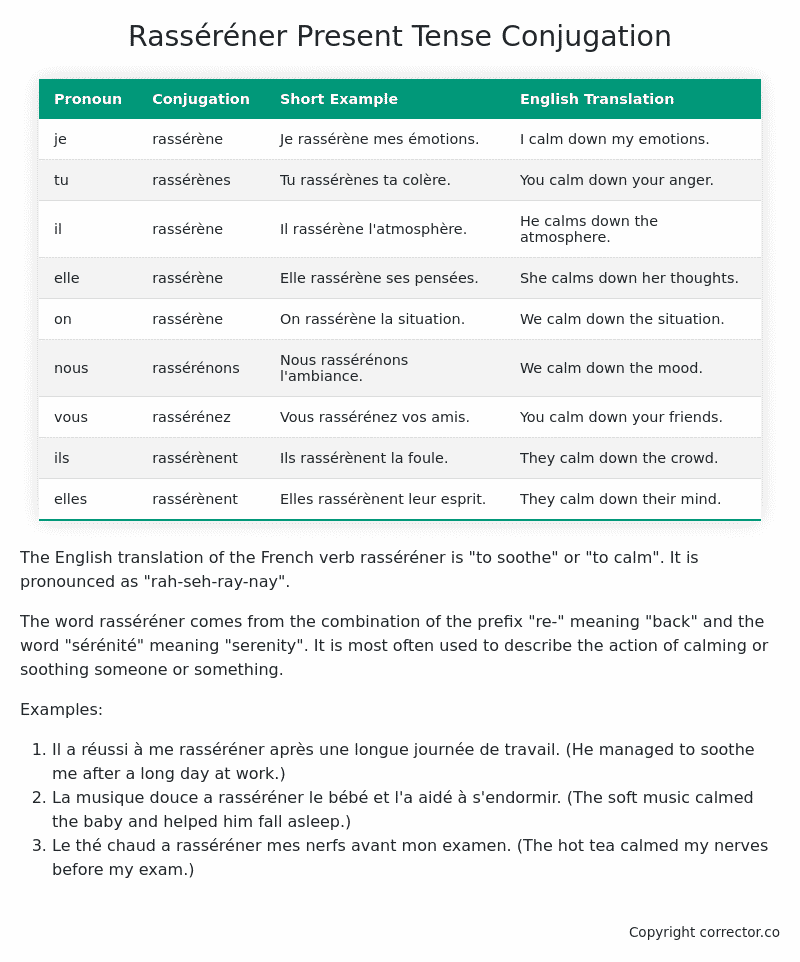Le Present (Present Tense) Conjugation of the French Verb rasséréner
Introduction to the verb rasséréner
The English translation of the French verb rasséréner is “to soothe” or “to calm”. It is pronounced as “rah-seh-ray-nay”.
The word rasséréner comes from the combination of the prefix “re-” meaning “back” and the word “sérénité” meaning “serenity”. It is most often used to describe the action of calming or soothing someone or something.
Examples:
- Il a réussi à me rasséréner après une longue journée de travail. (He managed to soothe me after a long day at work.)
- La musique douce a rasséréner le bébé et l’a aidé à s’endormir. (The soft music calmed the baby and helped him fall asleep.)
- Le thé chaud a rasséréner mes nerfs avant mon examen. (The hot tea calmed my nerves before my exam.)
Rasséréner – About the French Present Tense
To take a deep dive into all the French tenses then see our article on Mastering French Tense Conjugation.
Common Everyday Usage Patterns For Le Present
Interactions with Other Tenses
Table of the Present Tense Conjugation of rasséréner
| Pronoun | Conjugation | Short Example | English Translation |
|---|---|---|---|
| je | rassérène | Je rassérène mes émotions. | I calm down my emotions. |
| tu | rassérènes | Tu rassérènes ta colère. | You calm down your anger. |
| il | rassérène | Il rassérène l’atmosphère. | He calms down the atmosphere. |
| elle | rassérène | Elle rassérène ses pensées. | She calms down her thoughts. |
| on | rassérène | On rassérène la situation. | We calm down the situation. |
| nous | rassérénons | Nous rassérénons l’ambiance. | We calm down the mood. |
| vous | rassérénez | Vous rassérénez vos amis. | You calm down your friends. |
| ils | rassérènent | Ils rassérènent la foule. | They calm down the crowd. |
| elles | rassérènent | Elles rassérènent leur esprit. | They calm down their mind. |
Other Conjugations for Rasséréner.
Le Present (Present Tense) Conjugation of the French Verb rasséréner (this article)
Imparfait (Imperfect) Tense Conjugation of the French Verb rasséréner
Passé Simple (Simple Past) Tense Conjugation of the French Verb rasséréner
Passé Composé (Present Perfect) Tense Conjugation of the French Verb rasséréner
Futur Simple (Simple Future) Tense Conjugation of the French Verb rasséréner
Futur Proche (Near Future) Tense Conjugation of the French Verb rasséréner
Plus-que-parfait (Pluperfect) Tense Conjugation of the French Verb rasséréner
Passé Antérieur (Past Anterior) Tense Conjugation of the French Verb rasséréner
Futur Antérieur (Future Anterior) Tense Conjugation of the French Verb rasséréner
Subjonctif Présent (Subjunctive Present) Tense Conjugation of the French Verb rasséréner
Subjonctif Passé (Subjunctive Past) Tense Conjugation of the French Verb rasséréner
Subjonctif Imparfait (Subjunctive Imperfect) Tense Conjugation of the French Verb rasséréner
Subjonctif Plus-que-parfait (Subjunctive Pluperfect) Tense Conjugation of the French Verb rasséréner
Conditionnel Présent (Conditional Present) Tense Conjugation of the French Verb rasséréner
Conditionnel Passé (Conditional Past) Tense Conjugation of the French Verb rasséréner
L’impératif Présent (Imperative Present) Tense Conjugation of the French Verb rasséréner
L’infinitif Présent (Infinitive Present) Tense Conjugation of the French Verb rasséréner
Struggling with French verbs or the language in general? Why not use our free French Grammar Checker – no registration required!
Get a FREE Download Study Sheet of this Conjugation 🔥
Simply right click the image below, click “save image” and get your free reference for the rasséréner Present Tense tense conjugation!

I hope you enjoyed this article on the verb rasséréner. Still in a learning mood? Check out another TOTALLY random French verb present conjugation!


